In the Black Revisited
For the next five weeks, I am revisiting five articles about color philosophy that I wrote thirteen years ago. Two weeks ago, I talked about white ("The Great White Way Revisited") and last week I talked about blue ("True Blue Revisited"). Today, I'm going to talk all about black.
For each color, I'll answer the same six questions I answered back in 2003—but with a few added thoughts. Here are the six questions:
• What does the color desire? What is its end goal?
• What means does the color use to achieve these ends?
• What does the color care about? What does the color represent?
• What does the color despise? What negatively drives the color?
• Why does the color like its allies and hate its enemies?
• What is the color's greatest strength and biggest weakness?
Let's get to it.
What does the color desire? What is its end goal?
Black wants power.
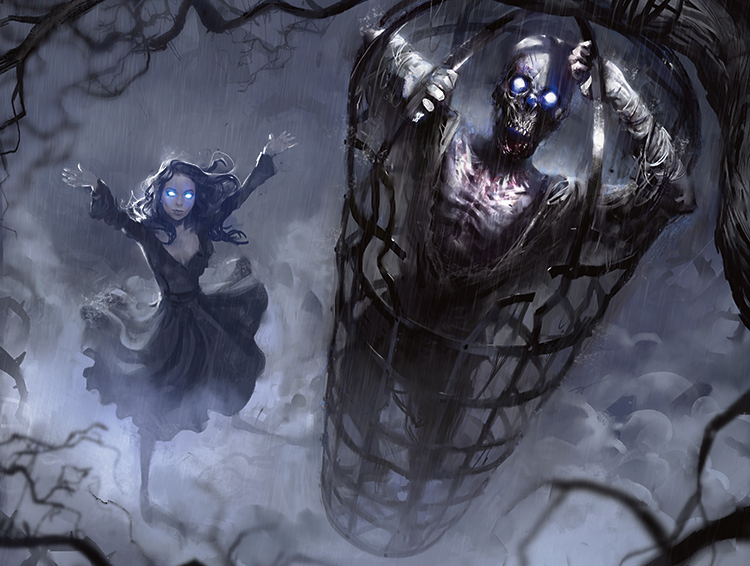
Cruel Revival | Art by Miles Johnston
Black looks at all the other colors and feels that each of them sees the world as they wish it to be. Black is the only realist, the only color to look and see the world as it is. An individual is free to have whatever they want, provided they have the power to obtain and keep it. This makes power the most important resource, because it's the one thing that can guarantee your ability to control your life and thus your happiness.
It's important for everyone to understand that black didn't make the world greedy. The world was already greedy; black has just learned how to thrive within it. Black has two big things on its side. One, it understands and accepts the system better than anyone else. And two, black doesn't place any restrictions on itself that make its success more difficult.
Black's philosophy is very simple: There's no one better suited to look after your own interests than you. Therefore, if everyone looks out after their own interests, you've created a system where everyone has someone looking out for them. In addition, black's system allows everyone the opportunity to succeed. Will everyone succeed? Of course not—but once again, that's not black's doing. That's just how the world works.
The weak will fail. That's what makes them the weak. Doing anything to help them is both prolonging the inevitable and risking failing alongside them. It's not personal to black. Black does what it needs to do to succeed. If others can't do the same, well, then they deserve their fate. Others see this as black being heartless, but black realizes it's just being pragmatic.
There will always be those who suffer. Once again, this isn't black's doing. It's an inevitability of life. Black's just the one color that owns up to the truth and acts accordingly.
What means does the color use to achieve these ends?
Black believes the key to success is its ability to take advantage of any opportunity. Other colors come up with reasons why they can't do something; black doesn't have that limitation. If black needs something, it can't let anything stand in the way. This means no taboos, no restrictions, no rules, no morals, no sympathy, no hesitation, and no regret. If you see something that will advance your agenda and help you acquire more power, you take it.
Black watches as others create reasons why something is off limits. Black can have no such weakness. Life is hard. Individuals don't have the luxury of passing by opportunities. One must take advantage of every opportunity, no matter the cost. These choices often come at a steep price, but that's the key to success—accepting that things you need will come with a cost that you will have to pay.
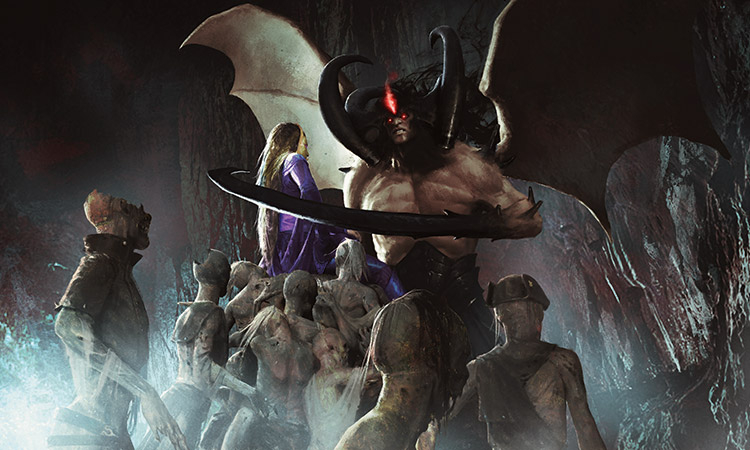
Dark Petition | Art by Igor Kieryluk
Because of this philosophy, black makes use of many resources that others reject. For instance, one of black's most effective weapons is death. The other colors feel it is "wrong" to meddle with such a force, but to black, not making use of something as powerful as death is the true crime.
This is another reason that black is so centered on itself. Many costs require the sacrifice of others for your own advancement. Because it puts itself first, black is always willing to make this trade. The weak must fall for the strong to thrive.
Others will try to flavor black's choices as somehow inherently wrong, but black understands that results are what matter, not perception. Caring what others think of you is a weakness.
What does the color care about? What does the color represent?
Here are a number of things black cares about, and why:
Death—Death is a potent and powerful force that most others write off due to taboos. Black doesn't care about taboos. Black cares about results, and death is an effective tool. As such, death has become a major weapon of black.
Undead—Death is not an end but often a beginning. Black makes use of not just death but dead things. Others have issues with making use of the dead, but black knows they make great servants.
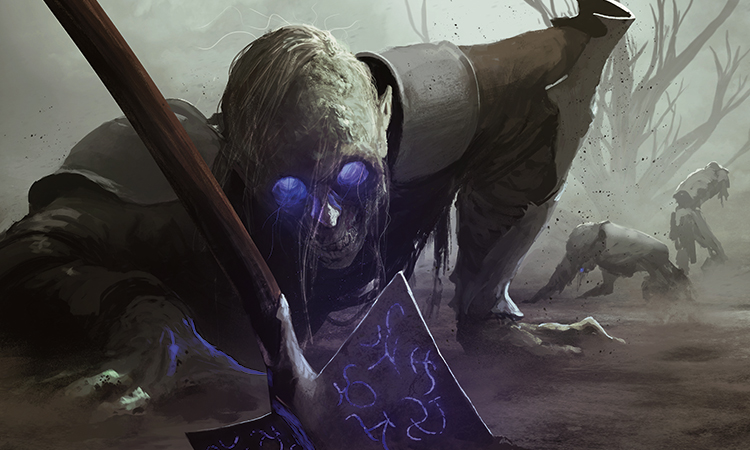
Undead Servant | Art by James Zapata
Amorality—Black is not immoral, as black doesn't believe in the concept of morality. Morality is a human construction meant to allow the weak to justify a false position of strength over those more powerful than themselves. Life is not divided into good and evil but rather into what must be done and what needn't be done.
Fear—Of all the emotions, fear is the one that black has found to grant it the easiest time getting what it wants quickly. Fear tends to motivate individuals to do whatever it takes to remove themselves from the situation that's making them afraid. Black has found this to be a very effective tool, and thus uses it often.
Sadness/Depression—If you need someone to act quickly, you use fear. If you need someone to be inactive, this is black's favorite emotion to get the job done.
Pain—This is another great motivator shunned by others. If you can do something simple that gains compliance, why wouldn't you use it?
Torture—Black never shies away from effective tools.
Darkness—First, no one can tell what you're doing in the dark, which makes it easier for black to get away with things. Second, it scares people, so that's a big plus. Third, the kinds of creatures that black tends to make use of often live and thrive in the dark. And finally, it represents keeping things hidden, which black has found to aid in accomplishing its goals.
Disease—Like death, disease is a potent and powerful force that most others shun due to silly taboos. It's effective, spreads easily and makes others weak—all things that work in black's favor.
Decay/Entropy—Things get weaker over time. Black has found this to be yet another natural force that it can bend to its desires.
Parasitism—The strong feed off of the weak. This is true from the micro to the macro.
Insects/Spiders—Others shy away from creepy, crawly things. Only more reason for black to use them.
Vermin—They're scary and carry disease. Win-win.
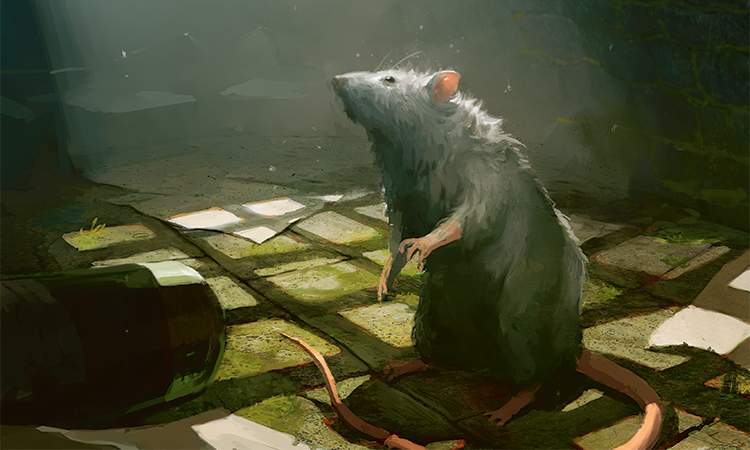
Drainpipe Vermin | Art by Trevor Claxton
Corruption—Individuals are inherently selfish. Black takes advantage of this universal truth, causing others to benefit themselves while helping black out.
Impurity/Contamination—Purity takes a lot of work, while contamination takes very little. A barrel full of sewage with a thimble full of wine is sewage; a barrel full of wine with a thimble full of sewage is also sewage. A little contamination can go a long way toward helping black achieve its goals.
Reduction—Black has proven much better at removing things than creating things.
Deceit—Many individuals put value in truth. They are fools. The illusion of truth as a force to be trusted is just an opportunity waiting to be taken advantage of.
Manipulation—If others won't do things because you asked nicely, just stop asking nicely. Once again, self-interest can be used to get individuals to do what you need them to do.
Machevelian Thinking ("The ends justify the means")—The means are meaningless. People who put value in them are wasting their strength in the wrong place. Who cares why or who or how? In the end, results are all that actually matter.
Individualism—Black's philosophy on self-reliance stresses how important it is for individuals to be able to look after themselves.
Destruction (calculated)—The weak focus on things that take more time and energy. The strong are the ones that understand where true strength lies. Destruction is far easier than creation. Therefore, black relies on destruction as a tool to accomplish what it needs. Note that unlike red, this destruction is not short-sighted but part of a larger goal.
Sacrifice of Others—Sometimes it takes sacrifice to get things done. Always starts with those that aren't yourself.
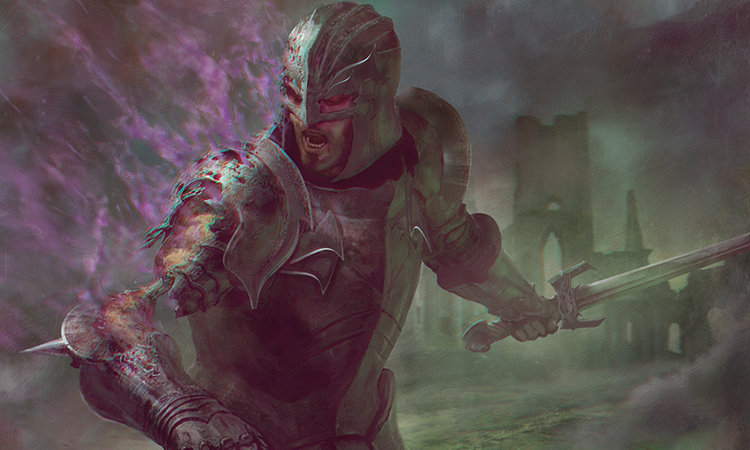
Ulcerate | Art by Johann Bodin
Sacrifices of Pieces of Self—Note though that sometimes you are going to have to be the one to sacrifice. What sets black apart is a willingness to do this when it is the most efficient course of action.
Execution—Death can be a motivating force to others if you can make a big show of it.
Self-Absorption—If you're the most important, why wouldn't you spend more time and energy on yourself?
What does the color despise? What negatively drives the color?
Black can't stand when others seem to reject the basic truths of life. For example, there are those who are willing to do things not for the good of themselves but rather for the good of others at the expense of themselves. Black considers these individuals to be idiots; dangerous idiots, because they take away black's ability to motivate them. Fear, pain, threat of death—what do you do when individuals would rather suffer than do what you want them to do?
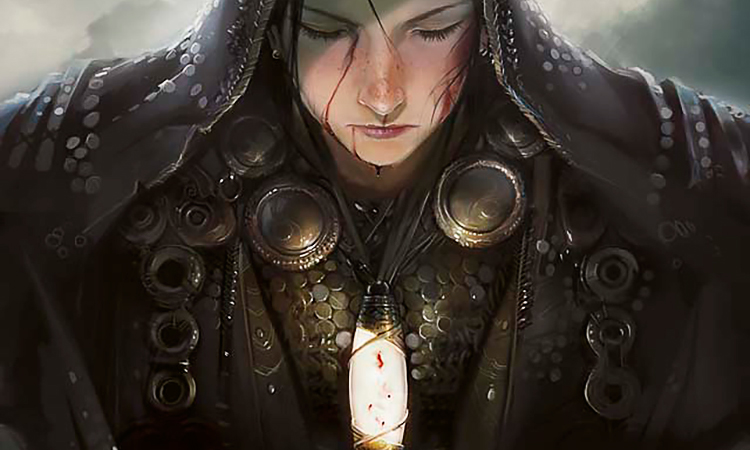
Angelheart Vial | Art by Chippy
Black is baffled by the various self-made forces that get people to act against their own self-interest. On one level, black is intrigued, wondering if there are things it could learn from these forces in order to fool individuals into believing they want to do what black needs them to do. But these forces also scare black, because they undercut many of the certainties black has built its entire philosophy around.
Why does the color like its allies and hate its enemies?
Black looks at blue and sees a fellow color that understands the need to manipulate and use trickery to get what it wants. Black appreciates that blue values information and uses that information as a means to achieve goals. Black understands blue's desire to have an emotional detachment with which to examine the world and do things that others often do not understand. Black likes blue's love of technology and its willingness to always find new tools to get the job done. Black dislikes that blue, at times, works towards the good of the group rather than the individual. Black also dislikes that blue is often motivated less by self-interest than by a desire to learn.
Black looks at red and sees a fellow color that isn't afraid to embrace its destructive side. Black likes that red looks within to make decisions and can put itself first. Black appreciates red's willingness to use violence and pain to encourage others to see things red's way. Black likes that red is able to ignore what others think of red and do what it feels is the correct thing for itself. Black doesn't like that red is short-sighted and often does things without understanding the repercussions. Black also doesn't like that red is willing at times to sacrifice itself for the sake of its loved ones.
Black thinks that white is dangerous. It coddles the weak and encourages them to work together. Even crazier, it created morality as an insidious tool to convince individuals to act against their own self-interest. Black realizes that white is a crafty enemy that, if left unchecked, threatens to jeopardize everything black has worked for. White is a master at propaganda, and has convinced the world that black is "evil" and must be stopped at all costs. Black can appreciate the cleverness of what white has done, but will stop at nothing until white and its minions are all dead.
Black realizes that green is also dangerous, but in a more subtle way. Green makes use of resources that black has less control over. Animals, for instance, work off of instinct and thus cannot be as easily motivated by such things as self-interest. Green also has tools that directly fight against many of black's tools. Life versus death or growth versus decay. Green, like white, is community-oriented and is able to pull together hordes of creatures that can overwhelm black's resources. Finally, green philosophically opposes an important tenet of black's philosophy, believing that individuals have the power to choose their own paths in life. Green's deterministic nature contradicts black's important belief in free will.
What is the color's greatest strength and biggest weakness?
Black's greatest strength is its willingness to do whatever is needed to get what black wants. Nothing is off limits to black, and that makes fighting against it tricky. Black is willing to do things that other colors cannot bring themselves to do. On the downside, black's willingness to do whatever it takes can often get black into trouble. Black will make calculated risks that will at times end up hurting black. In some ways, black's greatest enemy is not the other colors but itself; the color most likely to be responsible for black's downfall is black.
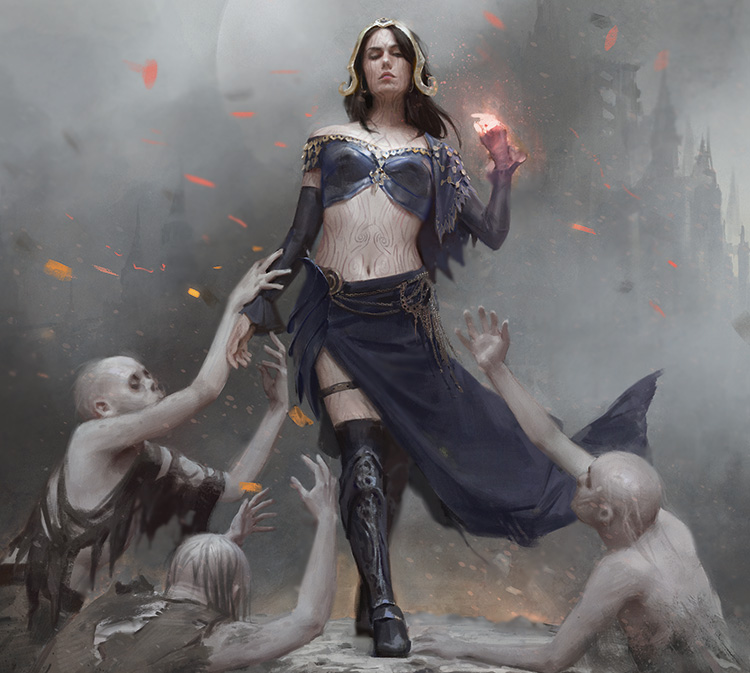
Liliana, Defiant Necromancer | Art by Karla Ortiz
Examples of Black Characters in Recent Pop Culture
Ramsay Bolton (Game of Thrones)
Torture, deceit, and unspeakable acts—Ramsay not only gets what he wants but enjoys watching others suffers as he does so. Ramsay thinks only of Ramsay.
Sarah Manning (Orphan Black)
Sarah has her priorities, which are herself and her daughter, and she will do whatever it takes to make sure that the two of them have what they need. She will lie, steal, and betray the confidences of others—she will do what needs to be done.
Fish Mooney (Gotham)
Fish wants what she wants, and heaven help those who get in her way. She'll pretend to be on your side, but the moment it's in her best interest, she'll stab you in the back.
Voldemort (Harry Potter)
Voldemort is a character who will truly do whatever is necessary to survive. He has no ethics, no loyalties, and no decency of any kind. All he cares about is getting what he wants.
Rocket Raccoon (Guardians of the Galaxy)
Rocket is a thief and a scoundrel who only looks out for Rocket. If he's ever on your side, it's clearly because you are somehow helping him get what he wants.
Reverse Flash (Flash)
If Eobard Thawne has to rewrite time itself to get what he wants (mostly to return to the future), he will do so, betraying the confidence of everyone he comes in contact with.
Bart Simpson (The Simpsons)
Bart not only looks out for Bart over and above anything else, he does so while seeing what pain and misery he can inflict on the world, taking great joy in the suffering of others.
Back in Black
And that is what black is all about. For each of these weeks on color philosophy, I am quite eager to hear your thoughts through my email or any of my social media (Twitter, Tumblr, Google+, and Instagram).
Join me next week, when it will be time to talk red.
Until then, may you learn the importance of occasionally putting yourself first.
"Drive to Work #246 – Early Trips"
This podcast is all about the three trips Wizards of the Coast sent me on before I started working for the company full-time.
"Drive to Work #247 – Judging"
For many years, I was a Level 4 judge and was actively involved in the judging program. I talk about that time and experience in this podcast.
- Episode 247 Judging (16.3 MB)
- Episode 246 Early Trips (16.1 MB)
- Episode 245 Black/Green (13.9 MB)
- Episode 244 Avacyn Restored, Part 4 (16.1 MB)
- Episode 243 Avacyn Restored, Part 3 (15.4 MB)

